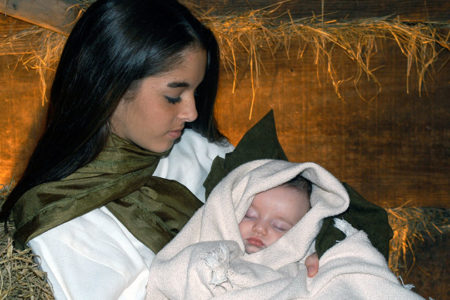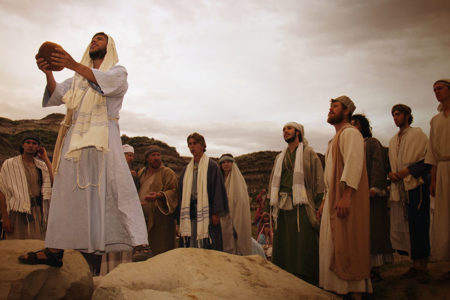The Love of God
Previously we focused on God’s anger and wrath. But the Bible also reveals Him to be a God of love, mercy, and grace.
God’s Love in the Old Testament
The primary Hebrew word for “love” in the Old Testament is ahabh. Together with its derivatives, it is used to express different types of human affection within various relationships, such as husband-wife (Gen. 24:67), parent-child (25:28), in-laws (Ruth 4:15), teacher-student (Prov. 9:8), servant-master (Ex. 21:5), people and military hero (1 Sam. 18:16, 22), and men with men (1 Sam. 18:1–3).1 Its use also includes “the concept of God’s love for man and man’s love for God.”2
Old Testament language scholar Gerhard Wallis wrote,
The word ahabh and its derivatives in the OT have a strikingly pragmatic character. Not only does love pre-suppose a concrete inner disposition which is based on experiences and events, but it includes a conscious act in behalf of the person who is loved or the thing that is preferred.3
He also said, “Love is not passive, but is active in the highest, most passionate degree.”4
These concepts indicate God’s love involves a confirmed, inner, favorable disposition toward the objects of His love and a high, passionate degree of action on behalf of them. They also imply man’s love for God must involve a confirmed, inner, favorable disposition toward God and a high, passionate degree of action on behalf of Him.
Objects of God’s Love
Israel’s Fathers. Moses told the people of Israel, “The Lᴏʀᴅ delighted only in your fathers, to love them” (Dt. 10:15). Historical background sheds light on the significance of that statement.
After God destroyed the wicked segment of humanity through the flood (Gen. 6—8), He gave a new commandment to mankind: “Be fruitful and multiply, and fill the earth” (9:1). He wanted people to spread out and populate the world.
Several generations later, however, people rebelled against God’s commandment by purposely beginning a major building project in order to make a name for themselves and not “be scattered abroad over the face of the whole earth” (11:4). This project began in what later became known as Babylon.
God responded by saying, “Indeed the people are one and they all have one language, and this is what they begin to do; now nothing that they propose to do will be withheld from them” (v. 6). He stopped the rebellion by causing them to speak different languages. Because they could not understand one another, they scattered (vv. 7–8) and formed nations based on language.
The first false religion after the flood began in the same area as the rebellion. It involved the worship of a mother-goddess named Ishtar,5 eventually called “The Holy Virgin,” “The Virgin Mother,”6 and “Queen of Heaven and Earth.”7 This religion spread to the nations.
In light of these perversions, God focused on one specific line of human descent that led to a man named Abram (11:10—12:1). God commanded Abram to move to a land He would show him, and He revealed the purpose for His attention on Abram and the land. Because of the nations’ perversions, God intended to bring a new, “great” nation into existence through Abram and his biological descendants (12:2). That nation would be great in that, through it, the Lord would bless all mankind (v. 3).
Consequently, God made Abram, the original father of that nation, a special object of His love. That love involved a confirmed, inner, favorable disposition toward Abram and a high, passionate degree of action on behalf of him and his biological descendants. Thus, on behalf of Abram and his descendants, God established an everlasting, unconditional covenant that gave them possession of the land of Canaan forever (vv. 6–7; 13:14–15; 15:7–21; 17:7–8).
Abram fathered two sons: Ishmael through his wife’s Egyptian maid, and Isaac through his wife, Sarah. Historians claim Ishmael fathered the Arab people. God distinguished between these two sons of Abram. He blessed Ishmael and promised to make a great nation of his biological descendants (17:20), but He refused to establish with Ishmael and his descendants the covenant He had established earlier with Abram (v. 21). God declared it would be established as an everlasting covenant with Abram’s other son, Isaac, and his biological descendants (vv. 19, 21).
The distinction between these two sons prompts several conclusions. First, the great nation God promised to make from Ishmael’s biological descendants is not the great nation God promised to bring into existence through Abram and his biological descendants for the purpose of blessing all of mankind. Second, God made Isaac a special object of His love as the next father of that great nation. Thus He later told Isaac,
Dwell in this land, and I will be with you and bless you; for to you and your descendants I give all these lands, and I will perform the oath which I swore to Abraham your father. And I will make your descendants multiply as the stars of heaven; I will give to your descendants all these lands; and in your seed all the nations of the earth shall be blessed (26:3–4).
Isaac fathered two sons, Esau and Jacob (25:21–26). When they became adults, he pronounced the following blessing on Jacob: “May God Almighty bless you, and make you fruitful and multiply you, that you may be an assembly of peoples; and give you the blessing of Abraham, to you and your descendants with you, that you may inherit the land in which you are a stranger, which God gave to Abraham” (28:3–4). Then Isaac sent Jacob to Padan Aram to seek a wife.
On his journey, Jacob dreamed of a ladder that ascended to heaven. God stood above the ladder and said,
I am the Lᴏʀᴅ God of Abraham your father and the God of Isaac; the land on which you lie I will give to you and your descendants. Also your descendants shall be as the dust of the earth; you shall spread abroad to the west and the east, to the north and the south; and in you and in your seed all the families of the earth shall be blessed. Behold, I am with you and will keep you wherever you go, and will bring you back to this land; for I will not leave you until I have done what I have spoken to you (vv. 13–15).
When Jacob returned to Canaan, God appeared to him again and blessed him:
God said to him, “Your name is Jacob; your name shall not be called Jacob anymore, but Israel shall be your name.” So He called his name Israel. “The land which I gave Abraham and Isaac I give to you; and to your descendants after you I give this land” (35:10, 12).
Jacob fathered 12 sons (29:31—30:24; 35:16–19). They became the heads of the 12 tribes that constituted the great nation descended from Abraham, Isaac, and Jacob—through which God promised to bring blessing to all families, or nations, of the earth.
Thus Jacob became the last father of that great nation (Ex. 3:15). Since the name of the last father was changed to Israel, the nation became known as the children and nation of Israel (vv. 11, 13).
Psalm 47:4 indicates God loved Jacob. Long after Israel became a nation, God said, “I have loved you.” Israel asked, “In what way have You loved us?” God answered the nation’s question by pointing out He loved Jacob, but hated Esau (Mal. 1:2–3; Rom. 9:13). That statement, plus the significant ways God dealt with Jacob, indicates He made Jacob a special object of His love as the last father of the great nation of Israel.
God’s dealings with Abraham, Isaac, and Jacob reveal God’s confirmed, inner, favorable disposition toward them and His high, passionate degree of action on their behalf. Thus Moses could honestly tell the people of Israel, “The Lᴏʀᴅ delighted only in your fathers, to love them” (Dt. 10:15).
The Nation Israel. The Hebrew Scriptures reveal the nation Israel was a primary object of God’s love. After God delivered the people of Israel from bondage in Egypt, Moses told them, “You are a holy people to the Lᴏʀᴅ your God; the Lᴏʀᴅ your God has chosen you to be a people for Himself, a special treasure above all the peoples on the face of the earth” (7:6).
The root meaning of the word translated “holy” is “to divide.”8 To be holy is to be divided from other people or things by being different, distinct, or unique in contrast with others. Thus Moses indicated God divided the Israelites from all other people in that He set them apart to have a unique relationship with Him—one not given to any other nation or people.
God chose Israel for this unique, privileged relationship because He “set His love on” that nation (7:7). The word translated “set” indicates this love was not prompted by “qualities inherent” in the nation or by “a sudden surge of emotion.”9 Instead, God’s love for Israel resulted from a “reasoned and unconditional decision” of the “past” to love that nation faithfully, “even under stress.”10
This fact implies God intended His love of Israel to consist permanently of a confirmed, inner, favorable disposition toward it and a high, passionate degree of action on Israel’s behalf. That permanent type of love guaranteed Israel would have this unique relationship with God forever.
King David verified this truth when he wrote, “Who is like Your people, like Israel, the one nation on the earth whom God went to redeem for Himself….You have made Your people Israel Your very own people forever” (2 Sam. 7:23–24).
ENDNOTES
- Gerhard Wallis, “ahabh,” Theological Dictionary of the Old Testament (hereafter cited as TWOT), ed. G. Johannes Botterweck and Helmer Ringgren, trans. John T. Willis, translated from Theologisches Worterbuch zum Alten Testament (Grand Rapids, MI: Eerdmans, 1974), 1:104.
- Ibid., 105.
- Ibid.
- Ibid., 106.
- Will Durant, Our Oriental Heritage (New York: Simon and Schuster, 1954), 123–24, 1045.
- Ibid., 235.
- Ibid., 236.
- Otto Proksch, “hagios,” Theological Dictionary of the New Testament, ed. Gerhard Kittel, trans./ed. Geoffrey W. Bromiley, translated from Theologisches Worterbuch zum Neuen Testament (Grand Rapids, MI: Eerdmans, 1964), 1:89.
- Gerhard Wallis, “ hasaq,” TWOT, G. Johannes Botterweck and Helmer Ringgren, trans. David E. Green, translated from Theologisches Worterbuch zum Alten Testament (Grand Rapids, MI: Eerdmans 1986), 5:262–263.
- Ibid.






